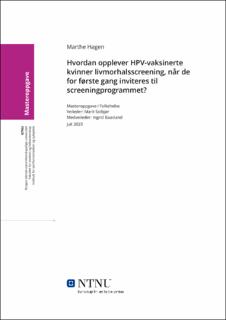| dc.contributor.advisor | Solbjør, Marit | |
| dc.contributor.advisor | Baasland, Ingrid | |
| dc.contributor.author | Hagen, Marthe | |
| dc.date.accessioned | 2023-11-03T18:19:26Z | |
| dc.date.available | 2023-11-03T18:19:26Z | |
| dc.date.issued | 2023 | |
| dc.identifier | no.ntnu:inspera:146522886:92229016 | |
| dc.identifier.uri | https://hdl.handle.net/11250/3100605 | |
| dc.description.abstract | Introduksjon: Livmorhalskreft utgjør et folkehelseproblem, ettersom det i 2021 var 340 kvinner som fikk diagnosen og 79 kvinner som døde av sykdommen i Norge. Vesentlige faktorer for å forebygge krefttypen er humant papillomavirus (HPV)-vaksinasjonsprogrammet og Livmorhalsprogrammet. De første kvinnene i Norge som ble vaksinert gjennom barnevaksinasjonsprogrammet ble, i 2022, for første gang invitert til å delta i livmorhalsscreening. Det er vist at HPV-vaksinens beskyttelse mot livmorhalskreft er sterk, men det er lite forskning som viser hva de HPV-vaksinerte kvinnene selv tenker om sammenhengen mellom vaksinen og livmorhalsscreening. I tillegg var aldersgruppen 25-33 år gruppen med lavest dekningsgrad i Livmorhalsprogrammet i 2021. Hensikten med denne studien var derfor å undersøke hvordan de HPV-vaksinerte kvinnene opplevde livmorhalsscreening, når de for første gang ble invitert til screeningprogrammet.
Metode: Studien var en kvalitativ intervjustudie, med semi-strukturerte intervju. Utvalget ble rekruttert ved bruk av snøballmetoden og besto av ti HPV-vaksinerte kvinner, født i 1997. Det ble gjennomført en tematisk analyse av datamaterialet.
Resultater: Studiens resultater viste at studiedeltakernes tillit til myndighetenes anbefalinger var bakgrunnen for hvorfor de var HPV-vaksinerte, hvorfor de hadde deltatt, eller ønsket å delta i livmorhalsscreening. Selv om tilliten var sterk skapte organiseringen av Livmorhalsprogrammet usikkerhet omkring dets viktighet. HPV-vaksinen medførte en trygghet om at de var friske, selv om kvinnene var usikre på dens dokumenterte effekt. Kvinnene ville derfor uavhengig av vaksinen deltatt i Livmorhalsprogrammet. Prøvetakerens kjønn og kompetanse hadde stor betydning for hvordan kvinnene opplevde screeningprogrammets troverdighet. Kvinnenes innhenting av informasjon på området var gjennom sosiale medier og samtaler med venner. Studien viste variasjon blant studiedeltakerne om deres synspunkter på informasjonen fra sosiale medier. Dette fordi flere oppfattet informasjonen som uetisk, fordi informasjonen opplevdes skremmende. Motsatt oppfattet noen av studiedeltakerne informasjonen som en fornuftig måte å øke deltakelsen i screeningprogrammet på.
Konklusjon: Studien viste at studiedeltakerne opplevde livmorhalsscreening som viktig, og viktigheten var forankret i deres tillit til at myndighetenes anbefalinger var for deres beste. HPV-vaksinen var en av flere grunner til hvorfor kvinnene ønsket å delta i livmorhalsscreening, ettersom de var usikre på vaksinens dokumenterte effekt. Samtidig var kvinnene usikre på Livmorhalsprogrammets viktighet, fordi de opplevde at informasjonen de innhentet appellerte til følelsene deres, og dermed ikke ble presentert på en riktig måte. | |
| dc.description.abstract | Introduction: Cervical cancer is a public health problem, as in 2021 there were 340 women who were diagnosed and 79 women who died of the disease in Norway. Essential factors for preventing this type of cancer are the human papillomavirus (HPV) vaccination program and the Cervical Cancer Program. The first women in Norway who were vaccinated through the child vaccination program were, in 2022, invited for the first time to participate in cervical screening. It has been shown that the HPV vaccine`s protection against cervical cancer is strong, but there is limited research showing what HPV vaccinated women think about the connection between the vaccine and cervical screening. Additionally, the age group 25-33 years was the group with the lowest coverage rate in the Cervical Program in 2021. Therefore, the purpose of this study was to investigate how HPV vaccinated women experienced cervical cancer screening when they were invited for the first time to the screening program.
Method: The study was a qualitative interview study, with semi-structured interviews. The sample was recruited using the snowball method and consisted of ten HPV-vaccinated women born in 1997. A thematic analysis of the data material was conducted.
Results: The studys results showed that the study participants trust in the authorities recommendations was the reason why they were HPV vaccinated, why they had participated, or wanted to participate in cervical screening. Although the trust was strong, the organization of the Cervical Cancer Program created uncertainty about its importance. The HPV vaccine brought reassurance that they were healthy, even though the women were unsure of its documented effect. Therefore, the women would have participated in the Cervical Cancer Program regardless of the vaccine. The gender and competence of the sample taker significantly influenced how the women perceived the credibility of the screening program. The women gathered information on the subject through social media and conversations with friends. The study showed variation among the study participants regarding their views on the information from social media. This was because some perceived the information as unethical, because the information was perceived as frightening. Conversely, some of the study participants perceived the information as a sensible way to increase participation in the screening program.
Conclusion: The study showed that the participants perceived cervical cancer screening as important, and the importance was rooted in their trust that the authorities recommendations were in their best interest. The HPV vaccine was one of several reasons why the women wanted to participate in cervical cancer screening, as they were uncertain about the vaccine`s documented effect. At the same time, the women were unsure about the significance of the Cervical Cancer Screening Program because they felt that the information they gathered played on their emotions and therefore was not presented accurately. | |
| dc.language | nob | |
| dc.publisher | NTNU | |
| dc.title | Hvordan opplever HPV-vaksinerte kvinner livmorhalsscreening, når de for første gang inviteres til screeningprogrammet? | |
| dc.type | Master thesis | |
